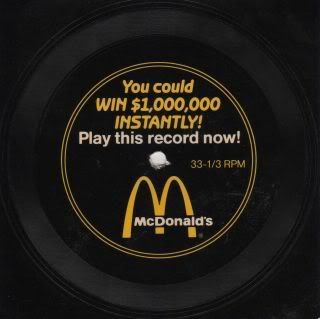History's Dumpster Mobile Link
History's Dumpster for Smartphones, Tablets and Old/Slow Computers http://historysdumpster.blogspot.com/?m=1
Wednesday, February 20, 2013
Big Fig Newton Commercial (Early '80s)
Labels:
1980s,
Advertising,
commercial,
Dances,
Food,
Gay,
Snacks,
TV
Tuesday, February 19, 2013
Carlton The Doorman
If you watched the classic '70s sitcom Rhoda, you will no doubt remember Carlton The Doorman (the heard-but-never-seen doorman to Rhoda's apartment building.)
The voice of Carlton the Doorman was the late Lorenzo Music.
You might better recognize his voice as the original voice of Garfield.
I found this record a long time ago. I've played this before to other people in the apartment building I managed and they all said this song reminds them of ME!
"Who Is It?" Carlton The Doorman (1975)
Monday, February 18, 2013
You Could Win......
Released as a Eva-Tone soundsheet promo from McDonalds in 1988 (at that unfortunate time when people were discarding their vinyl and turntables en masse for crappier sounding, overpriced CDs), this sweepstakes promo was one of the worst ever.
This record didn't win. And it's unbearable to hear again after one listen......
Labels:
1980s,
Contest,
Food,
Record,
Restaurants
Sunday, February 17, 2013
Saturday, February 16, 2013
"Au Claire de la Lune" Unknown (1860)
Just when you thought you've heard everything in music, comes a blast from the '60s....
That's the 1860s....
Almost two decades before Thomas Edison unveiled his tin foil cylinder phonograph, a little known French scientist named Édouard-Léon Scott de Martinville was also researching audio recording.
He built a device called a "phonautograph" that recorded sound waves.
However, unlike Edison, his device had no means of playback. His recordings were made on plate glass and later paper and stored, unplayed for nearly 150 years. There were no known means of playing the recordings without permanent damage to the extremely delicate grooves.
Finally, just a few years ago, with the aid of lasers and computer audio restoration, a 10 second snippet of a human voice singing "Au Clair de la Lune", recorded in February of 1860 was recovered from these recordings. An earlier 1859 recording of a tuning fork and possibly a bit of a human voice recorded in 1857 were also found. But that recording was too short to identify positively.
You can hear the "Au Clair de la Lune" recording below. Granted, the fidelity is extemely low, just barely recognizable. But it's history:
http://www.firstsounds.org/sounds/1860-Scott-Au-Clair-de-la-Lune.mp3
There is now a web site dedicated to the digitizing and preservation of phonautpgraph recordings:
http://www.firstsounds.org
The oldest playable recording up until then was the Lambert Talking Clock from 1878. Unlike Edison, who was recording and playing on weak tin foil at that time, Frank Lambert used a sturdy solid lead cylinder. Here is an MP3 of that (the audio on that too was barely recognizeable.):
http://www.tinfoil.com/lam-clock~.mp3
And until the recent playback of the 1860 phonautograph recording, this 1888 wax cylinder of Handel's Israel In Egypt was considered to be the earliest known surviving music recording. Again it's low fi, but eerily beautiful:
http://www.archive.org/download/EDIS-SRP-0154-17/EDIS-SRP-0154-17.mp3
It was recorded on a wax covered cardboard cylinder, hence the heavy surface noise - especially at the end.
It has been speculated that ancient etched pottery COULD hold sound vibrations from as far back as 1000 B.C. But that hasn't been proven yet. Pottery clay itself is among the worst substances to make a recording on and unless the person making the pottery was singing VERY loudly to tool etching a groove - a possibility, but a very distant one. I doubt it...
Cheers!
Labels:
1800s,
Computers,
Historical,
Music,
Obscure tech,
Records
Subscribe to:
Comments (Atom)







